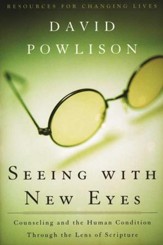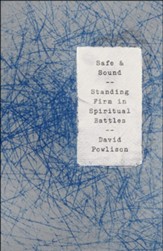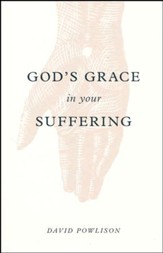
Quotes by David Powlison
Jesus comes forgiving and changing the immoral. He bridges the chasm between sordid and glorious. He invites us to cross over from death to life. What was perverted can be converted. To disagree with immorality is not simply to condemn the immoral. It is to identify particular forms of lostness that need finding. We worship a seeking and finding God. We have been sought out and found by a Savior. He reproves the unruly in order to invite us to come seek help.
Making All Things New: Restoring Joy to the Sexually Broken by David Powlison, ©2017. Used by permission of Crossway, a publishing ministry of Good News Publishers, Wheaton, Il 60187, www.crossway.org.
A true and enduring identity is a complex gift of Christ’s grace. He gives a new identity in an act of mercy. Then His Spirit makes it a living reality over a lifetime. When you see Him face to face, you will know Him as He truly is, and you will fully know who you are (1 Cor. 13:12).
Your true identity is who God says you are. You will never discover who you are by looking inside yourself or listening to what others say. The Lord gets the first word because He made you. He gets the daily word because you live before His face. He gets the last word because He will administer your final “comprehensive life review.”
Your true identity is a gift of God, a surprising discovery, and then a committed choice.
Here game plan when you start to worry and obsess:
1. Name the pressures. You always worry about something. What things tend to hook you?… Anxieties feel endless and infinite – but they’re finite and specific.
2. Identify how you express anxiety. How does anxiety show up in your life?
3. Ask yourself, Why am I anxious? Worry always has its inner logic… What do I want, need, crave, expect, demand, and lust after? Or what do I fear either losing or never getting? Identify the specific lust of the flesh. Anxious people “eagerly seek” the gifts more than the Giver. They bank treasure in the wrong place. What is preoccupying me, so that I pursue it with all my heart?
4. Which promise of Jesus [from the Bible] speaks to you most? Grab one promise and work with it.
5. Go to your Father. Talk to Him. Your Father cares about the things you worry about. Your Father knows what you need. Cast your cares upon Him, because He cares for you.
6. Give. Do and say something constructive. Care for someone else. Give to meet human need. In the darkest hole, when life is toughest, there’s always some way to give yourself away.
Excerpted from: Worry – Pursuing a Better Path to Peace, P&R Publishing, 2004, p. 27-30. Used by Permission.
All the things we worry about are what we want but could lose. That’s why we worry. The best thing you could ever want you will never lose, and you can always give it away.
Worry – Pursuing a Better Path to Peace, P&R Publishing, 2004, p. 26. Used by Permission.
Worriers act as if they might be able to control the uncontrollable. Central to worry is the illusion that we can control things… The illusion of control lurks inside your anxiety. Anxiety and control are two sides of one coin. When we can’t control something, we worry about it.
Worry – Pursuing a Better Path to Peace, P&R Publishing, 2004, p. 12. Used by Permission.
Pop theologies baptize the longings of sinful hearts: health and wealth, significance and security, self-esteem, power to get what you want. But the Holy Spirit is in the business of changing what you want.
Anxieties feel endless and infinite – but they’re finite and specific.
The lesser innocent pleasures come because the greatest pleasure, God Himself, is in His rightful place. Innocent pleasures don’t pretend to save you or protect you. They don’t promise you meaning and identity in life. They don’t take life’s fragility, pain, frustration, disappointment, and uncertainty and wash them away. They are not the giver of every good and perfect gift; they are just the gifts you enjoy. They are innocent because they don’t pretend to be anything more.
So how can you tell when a pleasure crosses the line from innocent to guilty? 1. The pleasure is plain wrong. 2. The pleasure captivates and captures you. 3. The pleasure is hidden. 4. The pleasure steals you away from the good. 5. The pleasure doesn’t deliver.
In the hands of a loving God, sorrow and suffering become the doorways into the greatest and most indestructible joys.
Wisdom is always living wisdom, conditioned by the times in which people live. Christian truth is eternal truth, but it is never timeless truth. It is always timely truth, addressed to specific people facing specific problems. It is not an assemblage of disembodied propositions, abstract principles, nameless and placeless verities. Almost every page of Scripture contains the names of specific people, places, and circumstances. That’s for a reason. Jesus Christ, who is the same yesterday, today, and forever, is forever meeting us, whoever we are right where we are.
Seeing With New Eyes, P&R Publishers, 2003, p. 257. Get this book!
If you just get the big things straightened out, you will have what you need in the little things. What everyone in the world is obsessed with, God makes a distant second. He’ll give you what you need to live on if you need Him in order to live.
Worry – Pursuing a Better Path to Peace, P&R Publishing, 2004, p. 21. Used by Permission.
The following are a smattering of examples of the “fig leaves” we wear:
1. We change the subject or crack jokes if an awkward or threatening subject arises.
2. We monopolize conversation, filling silences to keep others at bay and to keep from feeling like failures.
3. We live or die vicariously with a sports team.
4. We run from problems by watching TV, drinking, smoking, promiscuity, workaholism, compulsive eating.
5. We mock or “put in a box” those whose opinions or problems threaten our own commitments and behavior.
6. We get defensive, accusatory, testy, or talk loudly, or try to bully others to defend ourselves and make a show of competency.
7. We overdo penance by saying, “Poor me; I’m so horrible and such a failure,” by expressing maudlin repentance and wallowing in failures.
8. We minimize the seriousness of problems – “It’s nothing” – or the difficulty of change – “I promise “l’ll never do it again.”
9. We lie outright, to look good or to avoid looking bad.
10. We lie subtly, putting ourselves in the best light by innuendo, embellishment, or careful selection of data. This often accompanies subtle expressions of contempt or criticism for other people.
11. We think highly of our own opinions on every issue.
12. We tie up our identity in certain grandiose roles, like “counselor” or “parent” or “pastor.” Any of our functions and successes, real or imagined, can become fodder for self-deception.
13. We pray for help before performing a certain responsibility, and then rehearse our own success afterwards without thought of God.
Seeing With New Eyes, P&R Publishers, 2003, p. 189-190. Get this book!
God acts first to strengthen sufferers internally. If you “suffer in a Godward direction,” He gives you hope. It is in the context of suffering that God strengthens hearts in many ways:
1. The love of God pours out directly into the hearts of afflicted persons who rely on Him in hope (Rom. 5:3-5).
2. God becomes directly known – “seen” – in ways previously unimaginable (Job 42:5).
3. Our foolishness is revealed, so that we might receive growing wisdom directly from God (James 1:2-5).
4. We are remade into the image of Jesus, and established in the love of God (Rom. 8:29, in the context of 8:18-39).
5. We learn to trust and obey Jesus, who walked the path of unjust suffering ahead of us and now walks it with us (Heb. 4:14-5:9; 12:1-11).
6. Our self-centered cravings are revealed and our faith is purified and simplified (1 Peter 1:3-15).
Seeing With New Eyes, P&R Publishers, 2003, p. 102-103. Get this book!
[When suffering] you need to seek help. This help comes first and finally from the living God. He hears, helps, strengthens, and vindicates those who rely on Him. If you look anywhere else first, you will set yourself up for a fall. You will get snared in bitterness and revenge (spurning God for your pride). You will flee in avoidance and addiction (spurning God for your false refuges and comforts). You will develop a perverted dependency on others (spurning God for your trust in man). Sadly, our culture has awakened countless people to think about what evil-doers (“abusers”) have done to them, but it has cast them upon their own resources as “abuse victims.” Yet victims can properly understand their own sins and sufferings, and God’s grace.
Seeing With New Eyes, P&R Publishers, 2003, p. 107. Get this book!
The Christian life is a great paradox. Those who die to self, find self. Those who die to their cravings will receive many times as much in this age, and, in the age to come, eternal life (Luke 18:29). They will find new passions worth living for and dying for. If I crave happiness, I will receive misery. If I crave to be loved, I will receive rejection. If I crave significance, I will receive futility. If I crave control, I will receive chaos. If I crave reputation, I will receive humiliation. But if I long for God and His wisdom and mercy, I will receive God and wisdom and mercy. Along the way, sooner or later, I will also receive happiness, love, meaning, order, and glory.
Seeing With New Eyes, P&R Publishers, 2003, p. 161. Get this book!
Our desires are not a given, but a fundamental choice. Desires are most often unruly, disorderly, inordinate affections for XYZ, a good thing that I insanely need. Sometimes they are natural affections for xyz, made sane and orderly by subordination to passionate love for God that claims my heart, soul, mind and might. Our desires are often idolatrous cravings to get good gifts (overthrowing or ignoring the Giver). Sometimes they are intense desires for the Giver Himself as supremely more important than whatever good gifts we might gain or lose from His hand.
Seeing With New Eyes, P&R Publishers, 2003, p. 146-147. Get this book!
Let us be ruthless to root out theoretical structures that view people as psychological or socio-pyschological abstractions: the phenomena observed are not “ego defense mechanisms” but are pride’s offensive, defensive, and deceptive strategies. And let us also reject the therapeutic assumptions that are consequent to the theory: they are poor and deceptive substitutes for the Gospel of Jesus Christ.
Seeing With New Eyes, P&R Publishers, 2003, p. 198. Get this book!
We are meant to long supremely for the Lord Himself, for the Giver, not His gifts. The absence of blessings – rejection, vanity, reviling, illness, poverty – often is the crucible in which we learn to love God for who He is. In our idolatry we make gifts out to be supreme goods, and make the Giver into the errand boy of our desires.
Seeing With New Eyes, P&R Publishers, 2003, p. 134-135. Get this book!
Jesus is the pioneer [when suffering]. His passion began with sorrow, betrayal, and abandonment: “Father, let this cup pass from me.” The silence of a lamb before its shearers. “My God, my God, why have you forsaken me?” “I am thirsty.” This sufferer loved His enemies, as we are called to do. “Today you will be with Me in paradise.” “Father, forgive them, for they do not know what they are doing.” “Woman, behold your son…Behold your mother.” It wrapped up in commitment and hope: “It is finished.” “Into your hands I commit my spirit.”
Seeing With New Eyes, P&R Publishers, 2003, p. 103. Get this book!
God does not accept me just as I am; He loves me despite how I am. He loves me just as Jesus is; He loves me enough to devote my life to renewing me in the image of Jesus.
Seeing With New Eyes, P&R Publishers, 2003, p. 169-170. Get this book!
Covetous greed will make you angry and manipulative… Complacent, satisfied greed makes you care less about what really matters; because it lulls you to sleep… Anxious greed [will make you worry].
Seeing With New Eyes, P&R Publishers, 2003, p.114. Get this book!
What is motivating you or another?
1. What do you love? Hate (Matt. 22:37-39; 2 Tim. 3:2-4)?
2. What do you want, desire, crave, lust, and wish for? What desires do you serve and obey (Psm. 17:14-15; Pro. 10:3; 11:6-7; 1 Pet. 1:14; 2:11; 4:2; 2 Pet. 1:4; 2:10; Jas. 1:14-15; 4:1-3)?
3. What do you seek, aim for, and pursue? What are your goals and expectations (Mt. 6:32-33; 2 Tim. 2:22)?
4. Where do you bank your hopes (1 Pet. 1:13; 1 Tim. 6:17)?
5. What do you fear? What do you want? What do you tend to worry about (Mt. 6:25-32; 13:22)?
6. What do you feel like doing (Psm. 17:14-15; 73:23-28; Pro. 10:3; 10:28; 11:6-7)?
7. What do you think you need? What are your “felt needs” (Mt. 6:8-15; 6:25-31; 1 Ki. 3:5-14)?
8. What are you plans, agendas, strategies, and intentions designed to accomplish (Matt. 6:32-33; 2 Tim. 2:22)?
9. What makes you tick (Isa. 1:29-30; 50:10-11; Jer. 2:13; 17:13; Matt. 4:4; 5:6; Jn. 4:32-34; 6:25-69)?
10. Where do you find refuge, safety, comfort, escape, pleasure, security (Psm. 23; 27; 31; 46)?
11. What or whom do you trust (Psm. 23; 103; 131; Pr. 3:5; 11:28; 12:15)?
12. Whose performance matters? On whose shoulders does the well-being of your world rest (Psm. 49:13; Jer. 17:1-14; Phil. 1:6; 2:13; 3:3-11; 4:13)?
13. Whom must you please? Whose opinion of you counts (Pr. 1:7; 9:10; 29:25; Jn. 12:43; 2 Cor. 10:18)?
14. Who are your role models (Rom. 8:29; Eph. 4:24; Col. 3:10)?
15. On your deathbed, what would sum up your life as worthwhile (see all of Ecclesiastes)?
16. How do you define and weigh success or failure, right or wrong, desirable or undesirable, in any particular situation (Jud. 21:25; Pro. 3:5; 1 Cor. 10:24-27?
17. What would make you feel rich, secure, prosperous (Pr. 3:13-18; 8:10, 17-21; Matt. 6:19-21; 13:45-46; 1 Pet. 1:2-7)?
18. What would bring you the greatest pleasure, happiness, and delight? The greatest pain and misery (Matt. 5:3-11; Psm. 1; 35; Jer. 17:7-8; Lk. 6:27-42)?
19. Whose coming into political power would make everything better (Matt. 6:10)?
20. Whose victory or success would make your life happy? How do you define victory or success (Rom. 8:37-39; Rev. 2:7; Psm. 96-99)?
21. What do you see as your rights? What do you feel entitled to (1 Cor. 9; Rom. 5:6-10; Psm. 103:10)?
22. In what situations do you feel pressured or tense? Confident and relaxed (see the Psalms or refuge)?
23. What do you want to get out of life (Prov. 3:13-18; Matt. 6:1-5, 16-18)?
24. What do you pray for (Jas. 4:3; Matt. 6:5-1; Lk. 18:9-14)?
25. What do you think about most often? What preoccupies or obsesses you (Col. 3:1-5; Phil. 3:19; Rom. 8:5-16)?
26. What do you talk about? What is important to you? What attitudes do you communicate (Lk. 6:45; Pro. 10:10; Eph. 4:29)?
27. How do you spend your time? What are your priorities (Pro. 1:16; 10:4; 23:19-21; 24:33)?
28. What are you characteristic fantasies, either pleasurable or fearful? Daydreams? What do your night dreams revolve around (Psm. 17:14-15; 73:23-28; Ecc. 5:3-7; Gal. 5:16-25; Eph. 2:3; 4:22; 2 Tim. 2:22; Tit. 3:3).
29. What are your functional beliefs that control how you interpret your life and determine how you act (Heb. 4:12)?
30. What are your idols or false gods? In what do you place your trust? Or set your hopes (Jer. 17:5; Eze. 14:1-8; Ac. 26:18; Col. 3:5; 1 Jn. 5:21).
31. How do you live for yourself (Lk. 9:23-25; 2 Cor. 5:14-15)?
32. How do you life as a slave of the devil (Jn. 8:44; Ac. 26:18; Eph. 2:2-3:2; 1 Tim. 2:26; Jas. 3:14-16)?
33. How do you implicitly say, “If only…” (to get what you want, avoid what you don’t want, keep what you have) (1 Ki. 21:1-7; Heb. 11:25; Phil. 3:4-11)?
34. What instinctively seems and feels right to you? What are you opinions, the things you feel are true (Jud. 21:25; Pro. 3:5, 7; 12:15; 14:12; 18:2; Isa. 53:6; Phil. 3:19; Rom. 16:18)?
35. Where do you find your identity? How do you define who you are?
Excerpted from: Seeing With New Eyes, P&R Publishers, 2003, p. 132-140. Get this book!
Your ability to really love your enemies…to do good even to the ungrateful or wicked absolutely requires the intervention of the Godhead. It required that Christ suffer and die because of your natural enmity to God. It requires the Holy Spirit’s power to give you a wholly new life. It requires the Father’s patient hand to prune and grow you in a way of life that is otherwise impossible – even inconceivable. It requires nothing less than radical repentance, living faith, and renewal of your whole heart that you might begin to learn how to really love. Such faith working through love is the product of a good news worth living and dying for.
Seeing With New Eyes, P&R Publishers, 2003, p. 235. Get this book!
Take unilateral initiative, and don’t quit. Love your enemies. Unreciprocated love expresses the image of your Father.
Seeing With New Eyes, P&R Publishers, 2003, p. 238. Get this book!
The evil in our desires often lies not in what we want but in the fact that we want it too much. Natural affections (for any good thing) become inordinate, ruling cravings. We are meant to be ruled by godly passions and desires. Natural desires for good things are meant to exist subordinate to our desire to please the Giver of gifts. Grasping that the evil lies in the ruling status of the desire, not the object, is frequently a turning point in self-understanding, in seeing the need for Christ’s mercies, and in changing.
Seeing With New Eyes, P&R Publishers, 2003, p. 149. Get this book!
What happens when you are obsessed with getting people to like you? You become flirtatious or artificial, a coward or a deceiver, a chameleon or a recluse.
Seeing With New Eyes, P&R Publishers, 2003, p.79. Get this book!
The intellectual source for the notion that your experience of your father determines your view of the heavenly Father is psychodynamic psychology, not the Bible… In an earlier generation, one of the stock human excuses for unbelief was, “The church is full of hypocrites, so I don’t want anything to do with God.” That was more willful and bitter: “Get lost, God.” The new variant is more self-pitying: “I just can’t seem to trust God.” But the net effect is the same. No cry of “Abba, Father” springs from the heart. “My father didn’t love me, so my self-centeredness, self-pity, and unbelief have an underlying reason. Somebody else caused my problems; somebody else must fix them.”… People change when the Holy Spirit brings the love of God to their hearts through the Gospel. Whoever receives the Spirit of adoption as God’s child learns to cry out, “Abba, Father.” People change when they see that they are responsible for what they believe about God. Life experience is no excuse for believing lies; the world and devil don’t excuse the flesh. People change when biblical truth becomes more loud and vivid than previous life experience. People change when they have ears to hear and eyes to see what God tells us about Himself.
Seeing With New Eyes, P&R Publishers, 2003, p. 175-177. Get this book!
Way[s] to grow in the knowledge of God your Father even if your father sinned against you:
1. Identify and take responsibility for the specific lies, false beliefs, desires, expectations, and fears that poison your relationship with God.
2. Find and apply specific truths in the Bible that contend with those lies and cravings.
3. Turn to God for mercy and help, so that the Spirit of truth would renew you, pouring out His love freely.
4. Take responsibility for the specific sins you express toward your father (i.e. bitterness, willfulness, avoidance, blame-shifting, brooding, fears, people-pleasing, slander, lying, self-pity, etc.).
5. Turn to God for mercy and help, that the Spirit of love would enable you to bear his fruit thankfully.
6. Identify the specific sins committed against you… Identifying the wrongs helps you know what to forgive. It also makes it clear what God calls you to tackle constructively.
7. Ponder the good things your father did for you.
8. The Father gives the power to return good for evil rather than evil for evil… Come up with a plan for specific changes (i.e. forgiving, giving love, seeking forgiveness, forbearing, confronting constructively, refocusing your attention, pouring your energies into God’s calling, etc.).
9. Find wise believers to pray for you, hold you accountable.
Excerpted from: Seeing With New Eyes, P&R Publishers, 2003, p. 180-181. Get this book!
Opinions and beliefs are meant to be evaluated in the light of truth. What did happen? What do you think and believe? How do you judge people or your situation? Finally, is what you think true and righteous, or false and sinful? Instead of posing these sorts of questions, “I feel that…” ducks conscious evaluation of my ideas and judgments. What I feel just is. True-for-me replaces truth. The Bible has devastating things to say about leaning on your own understanding, about being wise in your own eyes, about the way that seems right to a man, and about people who delight in airing their opinions (see Prov. 3:5; 3:7; 14:12; 18:2).
Seeing With New Eyes, P&R Publishers, 2003, p. 213-214. Get this book!
The ambiguous words “I feel” are commonly used in four distinct ways. The phrase speaks of experience, emotions, thoughts, or desires. Serious problems arise because the word is typically loaded with authority: “If I feel it, then it’s inherently true, right, and valid.” Clear biblical thinking pierces the fog of ambiguity and authority that wraps itself around “feelings.” As minds and hearts are renewed by the Spirit’s life-giving truth, everything about us is touched.
Seeing With New Eyes, P&R Publishers, 2003, p. 216. Get this book!
The mind of man is a “factory of idols.” We are infested with lusts. Listen closely to any person given to complaining, and you will observe the creativity of our cravings.
Seeing With New Eyes, P&R Publishers, 2003, p.152. Get this book!
Scripture never separates motive and behavior. The mirror of Scripture exposes both. The lamp of Scripture guides both. The grace and power of Jesus Christ change both root and fruit.
Seeing With New Eyes, P&R Publishers, 2003, p. 141. Get this book!
Sexual immorality might occur for many different reasons: erotic pleasure, financial advantage, revenge on a spouse or parent, fear of saying no to an authority, pursuit of approval, enjoyment of power over another’s sexual response, the quest for social status or career advancement, pity for someone and playing the savior, fear of losing a potential marriage partner, escape from boredom, peer pressure, and so forth.
Seeing With New Eyes, P&R Publishers, 2003, p.153. Get this book!
Have you noticed that even people who feel lousy about themselves are judgmental toward others? When you feel inferior to others, you don’t respect them or treat them with mercy. Instead, you envy, hate, grumble, and criticize. Even self-belittling tendencies – “low self-esteem,” self-pity, self-hatred, timidity, fears of failure and rejection – fundamentally express pride failing, pride intimidated, and pride despairing. Such pride, even when much battered, still finds someone else to look down on.
Seeing With New Eyes, P&R Publishers, 2003, p.79. Get this book!
What everyone in the world is obsessed with, God makes a distant second. He’ll give you what you need to live on if you need Him in order to live.
Seeing With New Eyes, P&R Publishers, 2003, p.119. Get this book!
I’d like to propose that God’s love is much different and better than unconditional. Unconditional love, as most of us understand it, begins and ends with sympathy and empathy, with blanket acceptance. It accepts you as you are with no expectations. You in turn can take it or leave it. But think about what God’s love for you is like. God does not calmly gaze on you in benign affirmation. God cares too much to be unconditional in His love… Such real love is hard to do. It is so different from “You’re okay in my eyes. I accept you just because you’re you, just as I accept everybody. I won’t judge you or impose my values on you.” Unconditional love feels safe, but the problem is that there is no power to it. When we ascribe unconditional love to God, we substitute a teddy bear for the king of the universe… The word “unconditional” may be an acceptable way to express God’s welcome, but it fails to communicate its purpose: a comprehensive and lifelong rehabilitation, learning “the holiness without which no one will see the Lord.”
David Powlison Seeing With New Eyes, P&R Publishers, 2003, p. 164,166,168-169. Get this book!
God’s love is active. He decided to love you when He could have justly condemned you. He’s involved. He’s merciful, not simply tolerant. He hates sin, yet pursues sinners by name. God is so committed to forgiving and changing you that He sent Jesus to die for you. He welcomes the poor in spirit with a shout and a feast. God is vastly patient and relentlessly persevering as He intrudes into your life. God’s love actively does you good. His love is full of blood, sweat, tears, and cries. He suffered for you. He fights for you, defending the afflicted. He fights with you pursuing you in powerful tenderness so that He can change you. He’s jealous, not detached. His sort of empathy and sympathy speaks out, with words of truth to set you free from sin and misery. He will discipline you as proof that He loves you. God Himself comes to live in you, pouring out His Holy Spirit in your heart, so that you will know Him. He puts out power and energy. God’s love has hate in it too: hatred for evil, whether done to you or by you. God’s love demands that you respond to it: by believing, trusting, obeying, giving thanks with a joyful heart, working out your salvation with fear, delighting in the Lord.
Seeing With New Eyes, P&R Publishers, 2003, p. 165. Get this book!
[God’s love] is at God’s initiative and choice; it isn’t given out on the basis of my performance. God’s gospel love is not wages that I earn with a model life; it is a gift. It is a gift that I cannot earn; more than that, it is a gift that I do not even deserve. God loves weak, ungodly, sinful enemies. The gift is the opposite of what I deserve. God ought to kill me on the spot. Instead, He sent His Son to die in my place.
Seeing With New Eyes, P&R Publishers, 2003, p. 167. Get this book!
If you receive blanket acceptance, you need no repentance. You just accept it. It fills you without humbling you. It relaxes you without upsetting you about yourself – or thrilling you about Christ. It lets you relax without reckoning with the anguish of Jesus on the cross. It is easy and undemanding. It does not insist on, or work at, changing you. It deceives you about both God and yourself. We can do better. God does not accept me just as I am; He loves me despite how I am. He loves me just as Jesus is; He loves me enough to devote my life to renewing me in the image of Jesus.
Seeing With New Eyes, P&R Publishers, 2003, p. 169-170. Get this book!
Felt need are frequently taken as self-evident necessities to be acquired, not as deceptive slave-masters. Our culture of need reinforces the flesh’s instincts and habits. In most cases, a person’s felt needs are slang for idolatrous demands for love, understanding, a sense of being in control, affirmation, and achievement.
Seeing With New Eyes, P&R Publishers, 2003, p. 134. Get this book!
This use of feeling is also fuzzy and problematic. It loads implicit authority into our impulses, desires, intentions, choices, expectations, and fears. Far from being givens to obey, these are meant to be examined biblically. The words “I feel like” often obscure our responsibility for our desires. People act as if their “feel likes” were authoritative impulses! Deceptive desires determine choices.
The Bible teaches us that our “feel likes” are frequently desires of the flesh. Most of our “felt needs” are idolatrous desires. They are meant to be killed by the Spirit, not indulged. Such is the way of life, freedom, wisdom, and joy in Christ.
Seeing With New Eyes, P&R Publishers, 2003, p. 214. Get this book!



